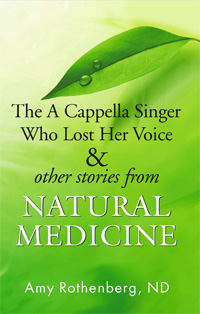Medical Resources for NDs
A Review of Current Publications for the Naturopathic Industry
Jacob Schor, ND

Huge effort is placed on objectivity in medicine; we wish for a clear view of the patient and his or her symptoms, illness, pathologic conditions, and possible treatment options on an idealized stage that is unmarred by our own subjective distortions. This is part of being scientific. The observer is detached, even nonexistent, in the equation—if not completely, then certainly in the dialogue. This has been the model for every book on practicing medicine that I have encountered.
Thus, opening this book by Amy Rothenberg is a startling experience, even for someone who knows her well. For inexplicable reasons, I feel that I know Amy well. The lives of her and her husband, Paul Herscu, have often seemed to move parallel with those of myself and my wife, Rena. They met at National College of National Medicine (Portland, Oregon), as we did; got married days after graduation, as we did; honeymooned on the Pacific Crest Trail, as we did; and so on. When I picked up their daughter Sophie at Denver (Colorado) International Airport a few years ago when she was going to stay in our daughter Sophie’s room for a few weeks before starting college, her first comment was about our car: “That’s the same car my mom drives.” I was not the least surprised. Rena and I often joke that if we were both younger, smarter, better looking, and more talented, we could be Amy and Paul.
Does this story seem like too much information? I write it because much of Amy’s book seems at first to be too much information. I wonder whether Sophie Herscu really wants everyone to read details of her childhood? I know that Sophie Schor might object vigorously. Yet, this is the style of Amy’s book—equal parts sharing how background information about her own life shapes her worldview crossed with what she observes in her practice of naturopathic medicine.
In retaining and even celebrating the observer present in her writing, Amy has done something unique. We know that she is present in her practice, and we learn who she is. Although the Heisenberg uncertainty principle (http://en.wikipedia.org/wiki/Uncertainty_principle) was published in 1927 (and it really deals with movement of subatomic particles and not human observations) and tells us that the observer affects the subject under study, we still only rarely know who the observer is when we read medical literature, but not in this case. As Amy writes about naturopathic medicine and homeopathy, we get to know her, her husband, her 3 children, the community of Amherst, Massachusetts, where she lives, and assorted other people, places, history, and passions that create the lens through which she views her patients.
At first, I found this disconcerting, unable to catalog the experience and equate it with the detached air in which many of us strive to practice medicine—that is, until I recognized it as an almost identical experience to preceptoring. Reading this book is like spending a week with Dr Rothenberg. It is like following Amy closely through her day, listening and watching how she interacts with her patients, but also learning what she does outside of work, the sort of things you would learn from another physician if you really spent time together. The book provides the added advantage that the reader is able to hear what Amy is thinking as well, a running dialogue on what she is looking for and thinking about during patient encounters. Indeed, if I could spend a month shadowing Amy, I might end up hearing many of the stories and lessons she has captured in her book, although she may be more candid and more eloquent in her writing than in person. This is the selling point for this book, at least for us, her colleagues. Who among us would not gain valuable insight from spending a month in Paul and Amy’s practice?
If this book was only written for her colleagues, then why does it include all the basic introductory background to naturopathy and homeopathy? Amy also anticipates that readers of this book will be her patients, not just her peers. She wants her patients to really understand what she does and why. We all share similar experiences of never having enough time to tell our patients everything we want them to know about all sorts of things: about exercise, about homeopathic theory, about the role herbs and vitamins can have in restoring health, about our philosophical foundations in medicine, and about our place in the world. It is frustrating that we do not get the chance to say everything we want to, certainly when time is short and patients are paying dollars per minute. Amy attempts to fill in the rest of her story for her patients. Striking a perfect balance between these dual purposes, educating both colleagues and patients, is perhaps too much to ask from a single book. Still, it worked for me. The material devoted to patient education is of interest; there is much of what she writes that I will repeat to my own patients as opportunities present.
Naturopathic physicians are not like other physicians. There is something inherent in our training that leaves us present as individuals in the room with our patients; we are always more than mere observers. By maintaining her presence as she writes and letting her own life slip onto the page, Amy Rothenberg reflects our profession’s unique approach to the practice of medicine.
Title: The A Cappella Singer Who Lost Her Voice & Other Stories From Natural Medicine
Author: Amy Rothenberg, ND
Publisher: Kuldeep Jain, India
Available from: http://www.bjain.com/books
Pages: 328
Style: Softcover
Copyright: 2011
MSRP: $25

